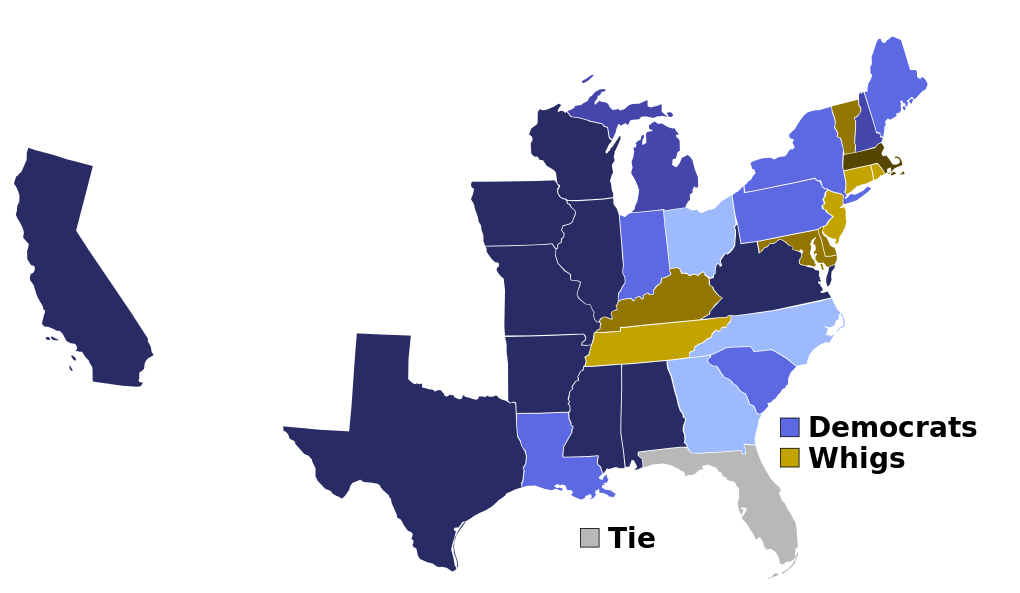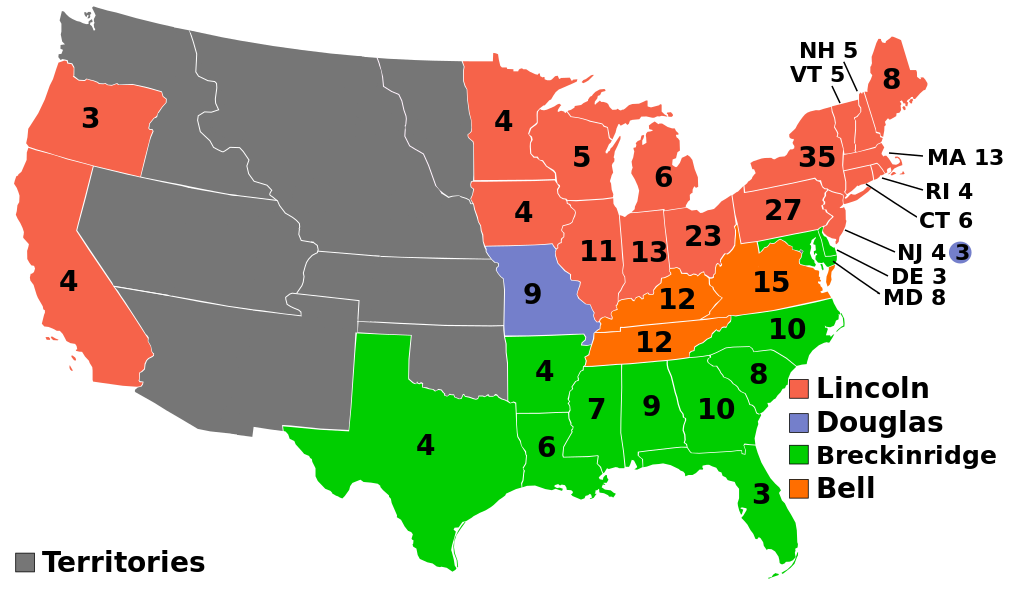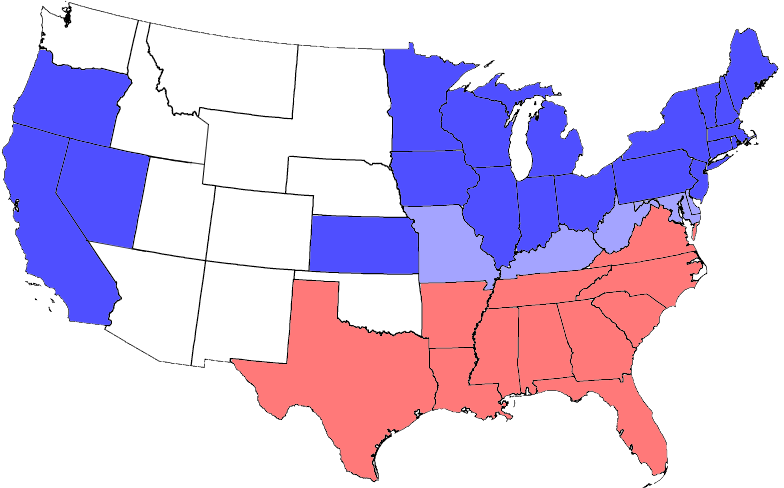American Legacies
This post started off as an email response to a friend with whom I was arguing about our current political situation (in 2018), but morphed into a discussion about American legacies: the legacies of the Founding Fathers, the legacy of the Civil War, and the legacy that the current president is forging. Despite being long winded, it’s still a reductionist approach to major historical events, guided by the arguments raised by my friend. Although several simultaneous developments and movements may have contributed to some of the trends discussed, I didn’t dive into any of them as that would be well beyond the narrow scope of our discussion.
A lot of the issues that you bring up understandingly keep alluding to the past. It seems the best way to approach current events is by first taking a brief detour of American history, guided by your comments or questions. Unfortunately, I couldn’t be brief enough, so I’ll be splitting this post into three parts. The first two parts establish the background to discuss the current events, which I’ll save for the third part.
The Founding Fathers and their Legacies
…on the takedown of such statues: what happens if someone down the line opposes the takedown of any George Washington statue? Washington was the first President of the United States – and he was also a massive slave owner… If someone opposes taking down George Washington’s statue, even for practical or sentimental reasons, do we automatically label that person a racist pig who supports slavery? I think that’s pretty damn stupid, and you guys know it. Trying to erase history by taking down statues and monuments could be dangerous; we have seen this unfold in other countries. And it doesn’t lead to good things down the line. It’s a slippery slope. Where does it end?
This is a good question. How do we treat the legacy of great men who nonetheless believed in slavery or other regressive beliefs that were debatably acceptable during their times, though we now know to be to inhumane. It’s a question that academics have asked for a long time and the American public is finally asking in the past decade or two. And the answer to that, unfortunately, is not a simple condemnation or condonation of their entire legacy; as one would expect, their legacy depends on the deeds of the persons and what their actions mean with respect to American history. So what is the legacy of the Founding Fathers? Let’s focus on a few of the the most prominent ones: Washington, Jefferson and Franklin.
All these men played critical roles in one or all of the following: the rebellion against the British, drafting the founding documents (the Declaration of Independence, the Constitution) and guiding the new country in its first two decades. Washington —after being the Supreme Commander of the American forces— chose to become president for only two terms, a precedent that was maintained for another century and a half. Jefferson —after his role as a delegate and ambassador during the rebellion— of course became our third president, and famously almost doubled the size of the US via the Louisiana Purchase. Benjamin Franklin —who was seventy at the time of the rebellion— was almost the founding grandfather of the nation. Most of his accomplishments in regards to the the US came before or during its founding, or in his role as an ambassador to further US interests. Unfortunately he passed away three years after the Constitution was ratified. I will skip over his philosophical and scientific legacies. So its easy to see the positive legacies of these men when it comes to their roles in the history of the United States of America.
What did we do to celebrate their legacies? We built monuments in their names: The Washington Monument, The Jefferson Memorial, the Benjamin Franklin National Memorial; we put them on our dollar bills; we put two of them atop Mount Rushmore; half of Philadelphia is named after Franklin…you get the idea.
But as it is quite obvious, I chose these particular men because two of these men were also slaveholders. There is no such things as a just or humane slaveholder, regardless of how nice they treat their slaves. Human beings are not properties. Regardless of the norms of their time, slavery was and is an inhumane institution. So how do these men fare when it comes to their negative legacies?
The legacy of Benjamin Franklin is the most intact. He held slaves for more than half his life, until 1770. But as he got older —despite possibly being a racist— he realized the inhumanity of the institution and was an abolitionist before he passed away. So in 2018 we can see that he saw the errors of his ways, and at least tried to advocate for the end of slavery before his end. On the other hand, Washington and Jefferson didn’t remove the stain of slavery from themselves before they passed away. Washington had up to several hundred slaves at one point in his life. There is evidence that he felt that the institution was wrong but perhaps between societal norms and capitalism, he didn’t set his slaves free during his lifetime. He did put it in his will to free all his slaves at his passing. This wish was fulfilled by his wife two years after his death. So on the whole, by his death he realized the injustice of this institution and although he didn’t have the courage to free his slaves during his lifetime, he did the next best thing as he went to God.
I saved Jefferson for last, as his legacy in regard to slavery is the portrait of a complex, flawed man. Jefferson also had several hundred slaves over his lifetime, which he never freed, even after his death. However, as a legislator and statesman, both in Virginia and in the US, he passed or tried passing several laws that limited the international slave trade and the spread of slavery over new American territory. So here was a hypocrite who knew slavery was wrong, and on a national level tried limiting its spread, yet continued to practice slavery in his own household. And to add to that, he even fathered children with one of his slaves. Which, to be clear, is rape.
So there it is— a ridiculously brief summary of their positive legacies with regards to the USA and their negative legacies that affected a large number of Americans. Coming full circle, why haven’t we taken down their monuments, statues, sculpted heads and faces from our currency? The answer, as unsatisfactory as it is, is because we think their service to our country as a whole is worth displaying and memorializing. This doesn’t mean that we forgive their sins or hide them. But we are saying that these are flawed men that are worth memorializing for the service they did to their country despite their ill treatment of a large subset of Americans.
Now there may come a time when we think that the service they did for their country is not worth dignifying due to the injustice of their actions towards Black Americans. Personally, given the outsized role these and other men played in founding and guiding the early country, I don’t think such a time will come any time soon (let’s arbitrarily say for next three hundred years if this country exists that long). But if that day of reckoning comes, that’s okay; we as a nation will argue and fight and decide what happens then. We can see that happening with the likeness of Andrew Jackson in the past few years. We as a nation realize he was a xenophobic demagogue and are starting to say that despite his achievements for the country he need not be memorialized in light of his sins, and there are efforts to phase out his likeness. One of these is the proposal to put the face of Harriet Tubman on the front of the twenty dollar bill to replace his face. I agree with that notion.
Now, for every statue or memorial that gets removed because of these reckonings, do we erase history? Of course not. If we demolish a statue, we erase history. I do not advocate that. Neither are historians or experts. We can move these removed statues to museums for recontextualization. That is what museums are for: to preserve and understand history, whether it is glorious or ugly. So in summary, I don’t think most of the early great men of the United States will have their memorials removed any time soon. And for any memorial that gets removed, they wont be erased from history, they will simply be moved into a museum so we can reflect upon why they were built in the first place, why they were removed, and what that means about the where the country stands at that moment.
The Founding of the Republican Party, Abraham Lincoln, and the Civil War
Do we eventually blow up Mt. Rushmore, as well, perhaps the most iconic monument of American history? Abraham Lincoln is one of the four faces on Mt. Rushmore. He freed the slaves, by the way. Oh, and he was also the first Republican President – in case you need a history refresher, the Republican Party (concentrated in the North) was formed in 1854 to OPPOSE the spreading of slavery, while the Democratic Party (concentrated in the South) was in favor of spreading it.
I felt that it was worth a bit of space to talk about the founding of the Republican Party and the causes of the Civil War before moving forward in time and topic. The Democratic-Republican party (precursor to the Democratic party) won a majority of the states in most elections before 1924, with the more industrial North serving as the stronghold for the Federalist party:
 Election results from 1796 to 1824. Click here for the map source and colormap legend. By Walk Like an Egyptian used under the CC-BY-SA 4.0 license.
Election results from 1796 to 1824. Click here for the map source and colormap legend. By Walk Like an Egyptian used under the CC-BY-SA 4.0 license.
As the country modernized and the attitudes towards slavery started evolving —when industrialization minimizes the need for manpower, people tend to remember slavery is unjust— the stranglehold that the now Democratic party had started loosening. The Whig Party was formed due to the discontent with the Democratic Party’s Andrew Jackson’s presidency. The Whig platform was quite broad, and didn’t seem to have a fixed stance towards slavery. The best way to describe the party was as an activist party, with some members, particularly in the north, were against slavery whereas others in the south were in favor of slavery. As you can see in the figure below, the Whigs won mostly in the northern free states, whereas the Democrats primarily continued to win in the slave states between 1828 and 1852. Do note that this was not just due to just anti-slavery sentiments; the Whig platform in general favored the more industrial north.
 Election results between 1828 and 1852. Click here for the map source and colormap legend. By Walk Like an Egyptian used under the CC-BY-SA 4.0 license.
Election results between 1828 and 1852. Click here for the map source and colormap legend. By Walk Like an Egyptian used under the CC-BY-SA 4.0 license.
As for the slavery issue itself, the Missouri Compromise —passed in the early 19th century— served as the peacekeeping mechanism between the northern states and the southern states by maintaining the ratio between the free states and slave states. Things came to a head with the passing of the Kansas-Nebraska Compromise in 1854 that voided the Missouri Compromise and let each territory choose whether it could be a free or slave territory (I’m skipping the Compromise of 1850, which dealt with the Western territories). At this point many Whigs, as well as a subset of Northern Democrats defected to form the Republican Party, primarily on the basis of their anti-slavery platform (p4, ¶2).
Needless to say, Lincoln won the election of 1860. The electoral college map looked like this:
 The election of 1860. By AndyHogan14 (public domain work).
The election of 1860. By AndyHogan14 (public domain work).
The anti-slavery Republican party only won in the north, whereas the other candidates, who were more of less ambivalent or pro-slavery split the south (interestingly, the Northern Democrats nominated Stephen Douglas whereas the Southern Democrats nominated John Breckinridge as presidential candidates). It is absolutely critical to realize the trend established over the past sixty-eight years of the country: it’s not the party that determines people’s attitudes, but in fact the people’s attitude that determines which party they voted for. The North voted for, and then abandoned the Federalists, the Democrats, and the Whigs to overwhelmingly vote for the newly formed Republican Party in 1860 as its platform fit their wants and needs. The South primarily voted for the Democratic Party over the same time period as its platform appealed to their desires and needs. So what did they want in 1860?
Well to keep a long story short, before Lincoln was even inaugurated, seven out of fourteen slave states made their intent clear by seceding to form the Confederate States of America (CSA). A total of eleven states eventually seceded, and the map of the US looked during the Civil War looked as follows (from 1964):

The states in pink formed the CSA. Click here for the map source and colormap legend. By Tom used under the CC-BY-SA 3.0 license.
As it should be quite apparent, the region that more or less consistently voted against the anti-slavery parties formed the CSA. I’m going to quote some fragments of the declarations or ordinances by some of the states that seceded and eventually ratified the eventual CSA constitution. I should note that most of the states had a generic statement for secession stating that the federal government has violated their state rights. But a few states pretty much stated the rules they wanted to push through with more autonomous state powers. Yes, they wanted more state rights to maintain slavery.
These excerpts are from South Carolina’s declaration of secession. Ctrl+F to go to the exact passage in the source:
…by the action of the non-slaveholding States. Those States have assumed the right of deciding upon the propriety of our domestic institutions; and have denied the rights of property established in fifteen of the States and recognized by the Constitution; they have denounced as sinful the institution of Slavery; they have permitted the open establishment among them of societies, whose avowed object is to disturb the peace and to eloign the property of the citizens of other States. They have encouraged and assisted thousands of our slaves to leave their homes; and those who remain, have been incited by emissaries, books and pictures to servile insurrection.
A geographical line has been drawn across the Union, and all the States north of that line have united in the election of a man to the high office of President of the United States whose opinions and purposes are hostile to slavery. He is to be entrusted with the administration of the Common Government, because he has declared that that “Government cannot endure permanently half slave, half free,” and that the public mind must rest in the belief that Slavery is in the course of ultimate extinction.
The Texas Ordinance of Secession:
…the recent developements in Federal affairs, make it evident that the power of the Federal Government is sought to be made a weapon with which to strike down the interest and prosperity of the people of Texas and her sister slaveholding States…
Texas’s declaration of secession:
She was received as a commonwealth holding, maintaining and protecting the institution known as negro slavery—the servitude of the African to the white race within her limits—a relation that had existed from the first settlement of her wilderness by the white race, and which her people intended should continue to exist in all future time.
the people have formed themselves into a great sectional party…based upon the unnatural feeling of hostility to these Southern States and their beneficent and patriarchal system of African slavery—proclaiming the debasing doctrine of the equality of all men, irrespective of race or color—a doctrine at war with nature, in opposition to the experience of mankind, and in violation of the plainest revelations of the divine law. They demand the abolition of negro slavery throughout the confederacy—the recognition of political equality between the white and negro races—and avow their determination to press on their crusade against us, so long as a negro slave remains in these States.
Virigina Ordinance of Secession:
the Federal Government having perverted said powers not only to the injury of the people of Virginia, but to the oppression of the Southern slave-holding States
So now we have a pretty clear clue as to why the Southern states seceded. At this point, one may argue that the other states don’t explicitly mention slavery in their declarations. However, the constitution of the Confederate States of America (CSA) makes it clear that secession was never about states’ rights. It was in fact about maintaining slavery. Their constitution, which had to be ratified by all the CSA states, explicitly mentions that no individual state can override the constitutional right to slavery. Here are some relevant passages from their constitution:
This is from Article I, Section 9(4) of the CSA constitution:
No bill of attainder, ex post facto law, or law denying or impairing the right of property in negro slaves shall be passed.
This is from Article IV, Section 2(3) of the CSA constitution:
No slave or other person held to service or labor in any state or territory of the Confederate States, under the laws thereof, escaping or lawfully carried into another, shall, in consequence of any law or regulation therein, be discharged from such service or labor: but shall be delivered up on claim of the party to whom such slave belongs, or to whom such service or labor may be due.
This about slavery in new territories, from Article IV, Section 3(3):
…In all such territory, the institution of negro slavery as it now exists in the Confederate States, shall be recognized and protected by Congress, and by the territorial government: and the inhabitants of the several Confederate States and Territories, shall have the right to take to such territory any slaves lawfully held by them in any of the states or territories of the Confederate states.
Just from the above passages, it is clear the CSA was not founded to preserve state rights. If that was the case, each state would be allowed autonomy for a large number of issues. However, the CSA constitution, which was largely based on the US constitution (and thus maintained the similar division between federal and state powers) added these passages to expressly maintain the centrality of slavery in their new country.
So why did I bring this up? I brought this up to compare the legacies of the founding fathers of the USA versus the founding fathers of the CSA. The former were flawed men who made a document and set-up institutions that over time allowed for the correction of its moral failings at the time of conception. It took seventy-nine years for the system to ban slavery, and it took another ninety-four years to ban discrimination. We still haven’t achieved true equality, but as it was said, ‘the arc of the moral universe is long, but it bends toward justice.’
But the founding fathers of the CSA, what about their legacy? Morally, they had no standing. Not only did they unrepentantly believe in slavery, they enshrined it in their constitution so that it could ‘continue to exist in all future time’ and were willing to fight for that right to subjugate fellow men. So morally they should not be celebrated. As I said in the section about the Founding Fathers, in the US we don’t put memorials and statues just based on moral standing; we base it on their contribution to the USA. So what did these traitors from the CSA do that we as United States citizens should celebrate their legacies? They not only held slaves, but fought a war killing Americans in hopes of perpetuating slavery. None of these things are worth celebrating or memorializing. Naturally, it begs the question, why did these memorials show up in the South (primarily)? What are these memorials celebrating?
Robert E. Lee and Jefferson Davis were traitors who indubitably represented the oppression of millions of Americans. The armies they lead killed hundred thousands of Americans. So they shouldn’t be memorialized for their deeds. Maybe the memorials were meant to represent some mythic Antebellum South. But in that South, 39% of the population were slaves, so there is no reason to use those particular men, and others like them, to celebrate that past. So indeed, why are the memorials there? We will come back to that later.
Let’s end this bit of history on a high note. Abraham Lincoln, the first Republican president may be the first or second greatest American that ever lived. His head should rightfully remain atop Mount Rushmore. I’m not quite sure why anyone would suggest the removal of his head from there. Unlike the Founding Fathers, he has no stains of slavery, set in motion events that ended slavery in the US, and heralded the country through its most difficult time yet.